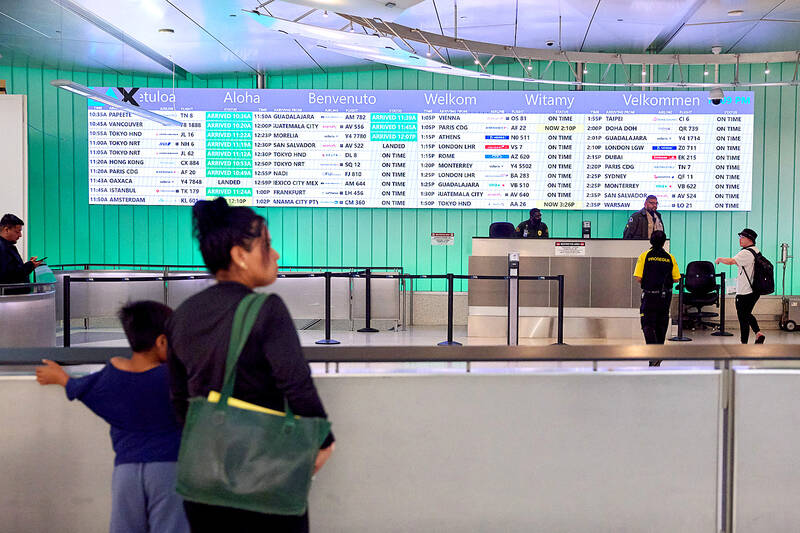The US Department of State on Friday instructed US embassies and consulates not to revoke visas previously issued to people from 12 mainly African and Middle Eastern countries under US President Donald Trump’s new travel ban, which goes into effect tomorrow.
In a cable sent to all US diplomatic missions, the department said “no action should be taken for issued visas which have already left the consular section” and that “no visas issued prior to the effective date should be revoked pursuant to this proclamation.”
However, visa applicants from affected countries whose applications have been approved, but have not yet received their visas would be denied, said the cable, which was signed by US Secretary of State Marco Rubio.

Photo: EPA-EFE
Unless an applicant meets narrow criteria for an exemption to the ban, his or her application would be rejected starting tomorrow.
Still, the cable, a copy of which was obtained by The Associated Press, suggests there should be no issue for current visa holders from the affected countries entering the US after the restrictions take effect at midnight Washington time tomorrow.
During Trump’s first term, a hastily written executive order ordering the denial of entry to citizens of mainly Muslim countries created chaos at numerous airports and other ports of entry, prompting successful legal challenges and major revisions to the policy.
The new proclamation, which Trump signed on Wednesday, appears designed to beat any court challenge by focusing on the visa application process.
Rubio’s cable says the only people who should be denied entry into the US are those currently outside the US who do not have a valid visa on the effective date.
Despite Rubio’s cable, physically entering the US at a port of entry is not controlled by the state department. It is up to the US Department of Homeland Security and the discretion of individual US Customs and Border Patrol agents to determine if a visa holder is admitted or turned away.
The visa ban applies to people from Afghanistan, Myanmar, Chad, the Republic of the Congo, Equatorial Guinea, Eritrea, Haiti, Iran, Libya, Somalia, Sudan and Yemen. Other visa restrictions are to apply to people from Burundi, Cuba, Laos, Sierra Leone, Togo, Turkmenistan and Venezuela.
Some exceptions apply only for specific countries, like Afghanistan. Others are for most of the countries, or are more general and unclear, like the policies for visitors planning to come to the US for the FIFA World Cup next year and the 2028 Los Angeles Olympics, two events Trump said he is excited to host.
Rubio’s cable said criteria for the exemptions under a national security waiver would be issued soon.